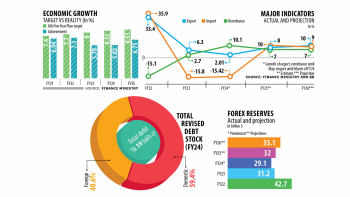Cut in agri subsidy will hurt farmers

Economists say allocation for the agriculture sector in the new budget is inadequate, and it will not only hurt farmers but may also affect food production.
In the 2024-2025 budget placed at parliament by Finance Minister Abul Hassan Mahmood Ali on Thursday, the allocation for farming and food security is Tk 38,259 crore, which accounts for 4.80 percent of the total.
In the 2022-2023 fiscal year, the allocation for farming was 4.97 percent, in the following year, it was 4.71 percent.
In the new budget, the Ministry of Agriculture gets Tk 27,214 crore, up from Tk 25,118 crore in the current fiscal year.
But the subsidy for the agriculture sector in the proposed budget is Tk 17,261 crore, down from Tk 17,533 crore.
Agricultural economist Jahangir Alam said, "Rice production in Bangladesh has grown by just 0.52 percent annually over the last three years, while the population has increased by 1.3 percent.
"When there is not enough investment in the sector, food prices rise. In order to boost grain production, more subsidies for farmers are crucial."
Moreover, fertiliser and oil prices have fallen in the global market, but not in Bangladesh.
"When the Russia-Ukraine war began, fertiliser and oil prices surged. Although the prices fell significantly last year, people in Bangladesh did not benefit from it," he added.
In his speech, Finance Minister Ali said, "Existing incentives to the agriculture sector will be continued since food security is of the highest importance here. We have given the highest priority to the agriculture sector in our budget."
However, many farmers were disappointed by the new budget.
Haider Ali, a 60-year-old farmer in Chapadaha area of Rangpur, said, "Every year, when a budget is announced, I think perhaps the government will support us. But it turns out the government does not really care much about us."
Cultivating the BR-28 variety of paddy on two bighas of land costs him around Tk 30,000, including expenses for fertiliser, seeds, irrigation, planting, and harvesting, he said.
"I get 34 maunds of rice from the land. Currently, the price of each mound is Tk 750. So, my entire harvest sells for Tk 25,500, which is less than what I spend," he added.
As Bangladesh's domestic food grain production has not increased significantly, the country is heavily reliant on imports.
According to the UN Food and Agriculture Organisation, Bangladesh imported around 12.5 million tonnes of food products in 2021.
The dependency on food imports increased from 9.3 percent of total food demand in 2010 to 11.2 percent in 2022.

 For all latest news, follow The Daily Star's Google News channel.
For all latest news, follow The Daily Star's Google News channel. 










Comments